Daily Vocabulary Words: List of Daily Used Words in Leading International Newspapers
Hi there. Welcome to this special section @ Wordpandit.
Our endeavour here is very simple: to highlight important daily vocabulary words, which you would come across in leading newspapers in the country. We have included the following newspapers in our selection:
• The New York Times
• The Washington Post
• Scientific American
• BBC
• The Guardian
• Psychology Today
• Wall Street Journal
• The Economist
We are putting in extensive work for developing your vocabulary. All you have got to do is be regular with this section and check out this post on a daily basis. This is your repository of words that are commonly used and essentially, we are posting a list of daily used words. Hence, this has significant practical application as it teaches you words that are used commonly in leading publications mentioned above.
Visit the website daily to learn words from leading international newspapers.
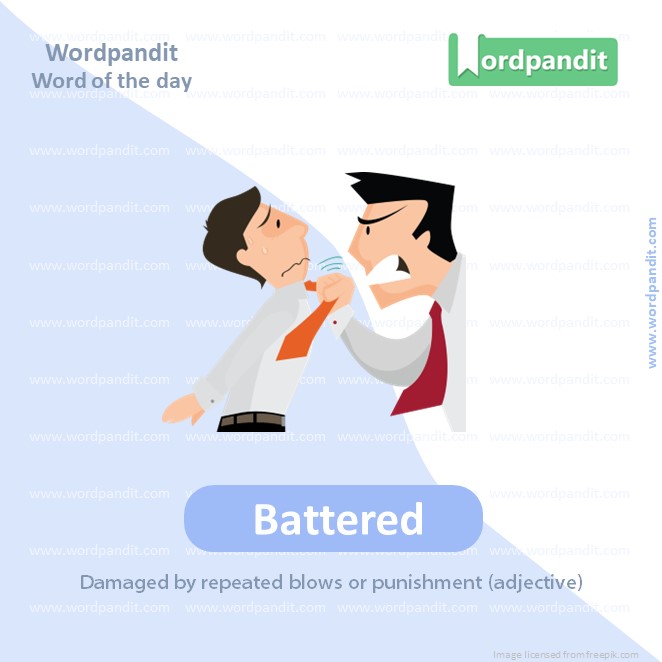
WORD-1: Battered
CONTEXT: It also releases a £3.3bn sweetener from the UK Treasury that Northern Ireland’s battered public realm badly needs.
SOURCE: Guardian
Explanatory Paragraph: Imagine your favorite toy getting dropped and hit lots of times, so it looks old and worn out. Battered means something has been hit and damaged many times, like how your toy looks after being played with a lot.
Meaning: Damaged by repeated blows or punishment (adjective).
Pronunciation: BAT-erd
Synonyms: Damaged, beaten, worn, abused, bruised, thrashed, dented.
Usage Examples:
1. The old house looked battered after the storm.
2. He wore a battered hat that had seen better days.
3. The battered book was still her favorite.
4. Her battered shoes showed how much she had traveled.
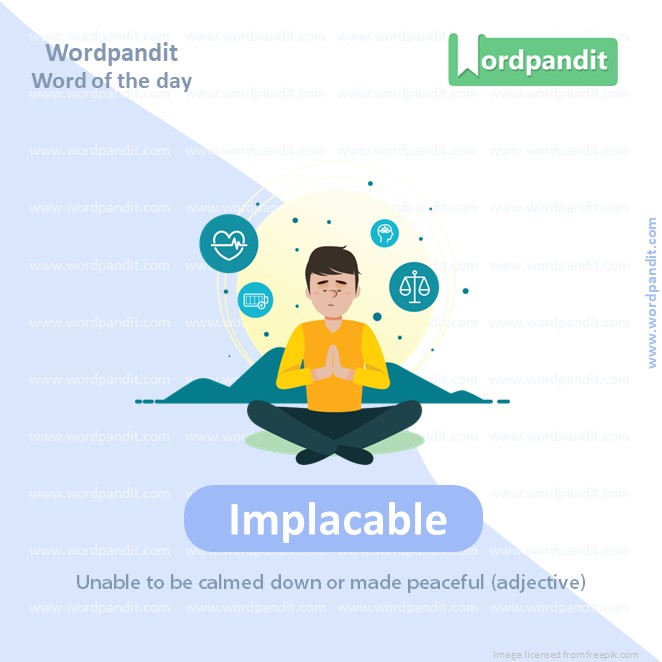
WORD-2: Implacable
CONTEXT: It is not a good sign for Donaldson that the whole supposedly secret DUP meeting was leaked in real time to the loyalist blogger Jamie Bryson, an implacable foe.
SOURCE: Guardian
Explanatory Paragraph: Think about trying to say sorry to someone who is really, really upset and no matter what you do, they just stay mad. Implacable is when someone cannot be calmed down or made to feel better, no matter what you try.
Meaning: Unable to be calmed down or made peaceful (adjective).
Pronunciation: im-PLA-kuh-bul
Synonyms: Unforgiving, relentless, inexorable, unyielding, unappeasable, unrelenting, inexorable.
Usage Examples:
1. The hero faced an implacable villain.
2. Her anger was implacable, even after his apology.
3. The implacable advance of the desert was a concern.
4. He was known for his implacable determination.
WORD-3: Receptors
CONTEXT: Nicotine is a brilliantly malevolent molecule. It stimulates reward receptors in the brain that light up with satisfaction at a job well done.
SOURCE: Guardian
Explanatory Paragraph: Imagine your body as a big amusement park, and the rides are special spots called receptors where messages, like little visitors, come to say “Hello!” These receptors listen to the messages and tell your body how to feel or react, like telling you when you’re hungry or cold.
Meaning: Special structures in the body that respond to certain types of substances (noun).
Pronunciation: re-SEP-tors
Synonyms: Sensors, detectors, antennae, feelers, receivers, transducers, binders.
Usage Examples:
1. Taste receptors on your tongue help you enjoy your food.
2. Pain receptors alert you when you’re hurt.
3. The drug works by blocking certain receptors in the brain.
4. Sunlight activates vitamin D receptors in the skin.
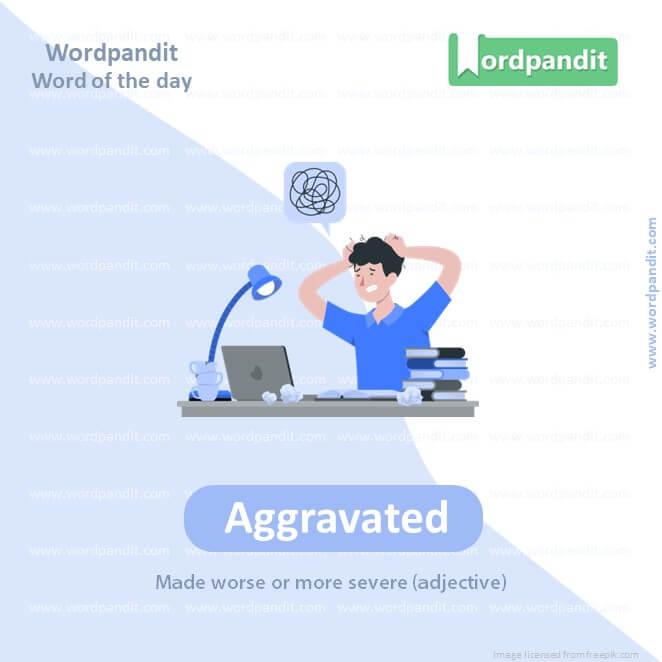
WORD-4: Aggravated
CONTEXT: Keir Starmer’s endorsement will only aggravate Tory suspicions that Sunak has lapsed into the worst kind of bossy, heavy-handed, lefty government. Liz Truss warns that a Conservative government should not be seeking to “extend the nanny state”.
SOURCE: Guardian
Explanatory Paragraph: Imagine you have a tiny scratch and you keep poking it. Instead of letting it heal, poking it makes it worse. Aggravated is when you make something that’s already a bit bad even more troublesome or annoying, like poking that scratch.
Meaning: Made worse or more severe (adjective).
Pronunciation: AG-ruh-vate
Synonyms: Worsen, exacerbate, intensify, increase, complicte, irritate, inflame.
Usage Examples:
1. Constant noise can aggravated stress levels.
2. Picking at a scab will only aggravated the wound.
3. His remarks served to aggravated the conflict.
4. Cold weather can aggravated arthritis symptoms.
WORD-5: Absurdity
CONTEXT: A fair practical criticism of the plan points to the absurdity of a threshold cohort, born either side of 2009, growing into adulthood with differential access to tobacco.
SOURCE: Guardian
Explanatory Paragraph: Imagine seeing a dog wearing glasses and reading a newspaper. That’s so silly and makes no sense, right? Absurdity is when something is really silly or doesn’t make sense at all, just like the dog acting like a person.
Meaning: The quality of being ridiculous or wildly unreasonable (noun).
Pronunciation: ab-SUR-di-tee
Synonyms: Ridiculousness, foolishness, nonsense, lunacy, silliness, irrationality, insanity.
Usage Examples:
1. The absurdity of the situation made everyone laugh.
2. He pointed out the absurdity of the rule.
3. They found themselves laughing at the absurdity of their argument.
4. The movie’s plot was an exercise in pure absurdity.
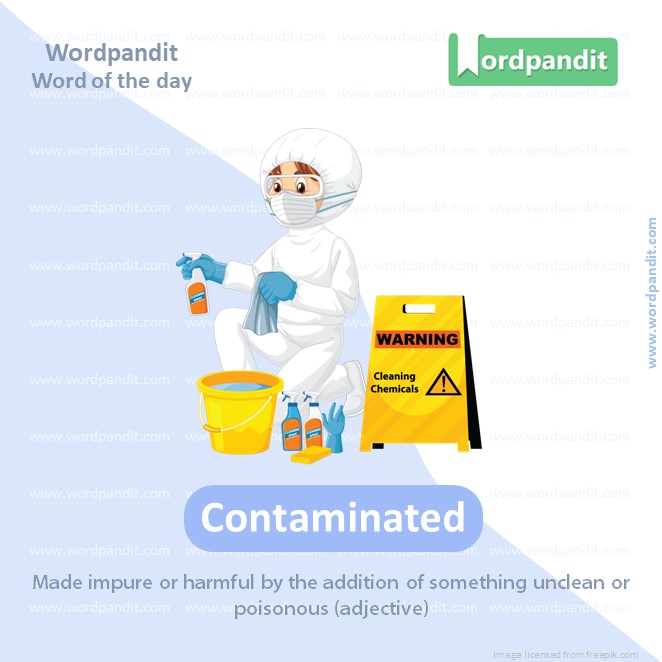
WORD-6: Contaminated
CONTEXT: But Sunak gets no credit for agreeing with ideological purists because his record is contaminated with bouts of pragmatic governmen
SOURCE: Guardian
Explanatory Paragraph: Imagine you have a clean glass of water, but then someone drops dirt into it. Now the water is not clean anymore because it got mixed with something bad. Contaminated means something was clean or safe but then got dirty or unsafe because bad stuff got into it.
Meaning: Made impure or harmful by the addition of something unclean or poisonous (adjective).
Pronunciation: kuhn-TAM-ih-nay-ted
Synonyms:Polluted, tainted, poisoned, infected, spoiled, adulterated, corrupted.
Usage Examples:
1. The river was contaminated with chemicals.
2. They had to throw out the contaminated food.
3. Drinking contaminated water can cause illness.
4. The lab samples became contaminated and unusable.
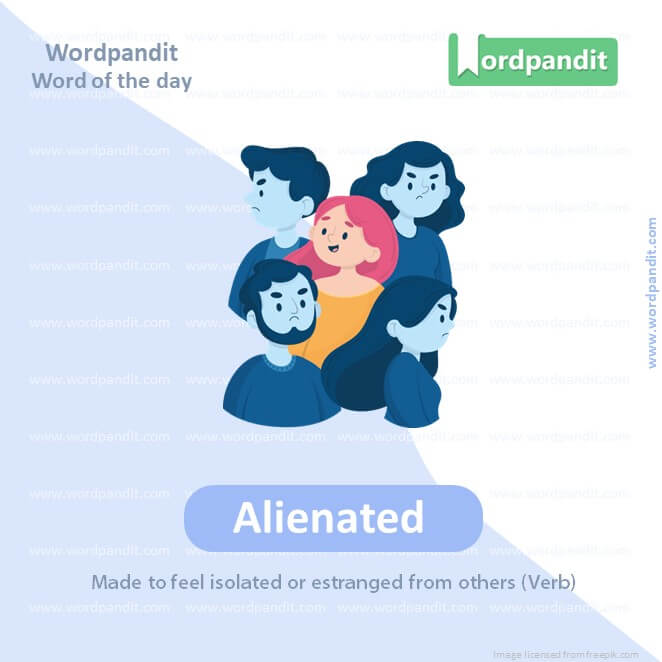
WORD-7: Alienated
CONTEXT: the Tory has the right grounds to think him prone to treason, and insistent enough on his orthodox Thatcherite credentials to alienate anyone who might once have seen his ideological flexibility as a virtue.
SOURCE: Guardian
Explanatory Paragraph: Imagine you have a group of friends, but one day you start making fun of them or not sharing your toys, and they don’t want to play with you anymore. Alienated means doing or saying things that make others not want to be around you or feel like you’re not friends anymore.
Meaning: Made to feel isolated or estranged from others (Verb).
Pronunciation: AL-ee-uh-nate
Synonyms: Estrange, distance, isolate, separate, disconnect, divide, disaffect.
Usage Examples:
1. His behavior began to alienate his friends.
2. The new policy could alienate the company’s clients.
3. She felt alienated from her family.
4. The decision alienated many of his supporters.
WORD-8: Quixotic
CONTEXT: why the anti-nicotine crusade feels quixotic. It is easy enough to see why the health-conscious, teetotal prime minister might abhor smoking.
SOURCE: Guardian
Explanatory Paragraph: Imagine someone trying to fly by flapping their arms really hard, believing they can soar like a bird. Quixotic means having big dreams or ideas that are really imaginative but maybe not practical or likely to happen, just like trying to fly without wings.
Meaning: Exceedingly idealistic; unrealistic and impractical (adjective).
Pronunciation: kwik-SOT-ik
Synonyms: Idealistic, romantic, visionary, impractical, unrealistic, utopian, dreamy.
Usage Examples:
1. His quixotic quest for hidden treasure was exciting but hopeless.
2. The plan was dismissed as a quixotic idea.
3. She admired his quixotic dedication to the cause.
4. The quixotic nature of the project did not deter them.
WORD-9: Recoiling
CONTEXT: it would be just as easy to imagine the pro-market, small-state Conservative leader recoiling from nanny statecraft in countless other areas.
SOURCE: Guardian
Explanatory Paragraph: Imagine touching something really cold or hot and quickly pulling your hand away. Recoiling is when you quickly move back or jump away from something because it scares you, hurts you, or surprises you.
Meaning: Suddenly springing back or flinching away in fear, horror, or disgust (verb).
Pronunciation: re-KOIL-ing
Synonyms: Flinching, shrinking, withdrawing, retreating, shrinking back, jumping back, pulling away.
Usage Examples:
1. She recoiled in horror at the sight.
2. He recoiled from the hot stove.
3. The snake recoiled before striking.
4. They recoiled at the idea of eating insects.
WORD-10 Debilitates
CONTEXT Junk food also debilitates the individual will to abstain.
SOURCE: Guardian
Explanatory Paragraph: Think about feeling so tired after running a lot that you can’t run anymore or even walk fast. Debilitates means making someone or something very weak or less able to do things, just like being super tired makes you less able to run.
Meaning: To make weak or feeble (verb).
Pronunciation: dih-BIL-i-tates
Synonyms: Weakens, enervates, exhausts, drains, saps, enfeebles, incapacitates.
Usage Examples:
1. The illness debilitates the patient significantly.
2. Lack of food and water debilitated the hikers.
3. The heat was so intense that it debilitated the runners.
4. Continuous work without rest debilitates the mind and body.
Vocabulary Daily Use
In the fascinating world of language learning, we often concentrate on taking giant leaps, but the real magic lies in the small steps of ‘vocabulary daily use’. These frequently used words and phrases form the backbone of practical communication and understanding. Therefore, mastering ‘vocabulary daily use’ is a crucial element in achieving language fluency.
To effectively learn ‘vocabulary daily use’, one needs to venture beyond the traditional textbook resources. The real essence of these words unveils itself in everyday exposure and interactions. Engaging with a variety of material like novels, magazines, newspapers, podcasts, films and digital content deepens the understanding of ‘vocabulary daily use’. Immersion in these contexts yield natural, everyday language that bridges the gap between the classroom and the real world.
The journey of mastering ‘vocabulary daily use’ necessitates the integration of innovative memory techniques. Flashcards and the Leitner System aid in embedding these words into your long-term memory by promoting active recall. Additionally, the use of mnemonic devices, which allow you to associate ‘vocabulary daily use’ with personal and familiar narratives, can enhance your ability to remember and recall these words.
Moreover, it’s important to remember that ‘vocabulary daily use’ isn’t just about comprehension- it’s about practice and active usage. Incorporate these words in your day-to-day communication and social interactions. This not only solidifies your understanding but also accelerates learning and internalization of ‘vocabulary daily use’.
In a nutshell, mastering ‘vocabulary daily use’ is a continual process that demands exposure, creative learning strategies and assertive practice. The commingling of these tactics brews the perfect formula that allows learners to seamlessly integrate ‘vocabulary daily use’ into their linguistic repertoire. And with that, they can navigate the nuances of language with confidence and ease.






